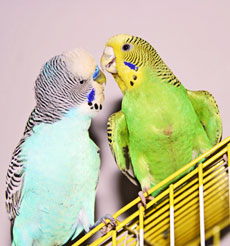
Unlike our pet dogs and resident cats, the parrot is not a domesticated animal but a wild bird. As such, much of its behavior is determined by the manner by which it had existed in the wilds. However, parrots are also highly intelligent animals and with this intelligence comes a certain degree of sensitivity to respond to the kindness and attention of humans. Simply put, your pet parrots behavior is actually the product of both nature and nurture – the manner by which you, its human master, had developed its socialization skills.
Despite the belief of some that certain behavior are exclusive to certain species, there have been many situations where this theory has been proven to be false. While its true that there are certain generalizations in as far as parrot behavior and its development are concerned, these have nothing to do with individual species but with parrots in general. One such generalization that is accepted as truth asserts that a well-loved bird is a happy and confident bird. This is true for all parrots. In fact, its probably true for all people as well.
Parrot care and behavior experts are quick to identify ways by which we can guarantee that we end up with a gentle and sweet pet and not a wild and rambunctious animal in our home.
•When buying a baby parrot, observe its behavior and get the one that is excited and eager to know you and discover its surroundings. Stay away from those who seem to be so fearful of things around them even though nothing in their surroundings merit such fear. Buy the baby parrot that has fully weaned and is already eating a good diet.
•Raise your pet in an atmosphere that is clean but not isolated. As flock birds parrots love company. Situate your pets cage in an area where it can be with the rest of the family.
•Take the lead in teaching your bird love and affection and in helping it develop trust. Remember no bonding with your pet can take place unless he/she trusts you. Part of the feeling that you are its protector is establishing that you are in charge. Just like when you present yourself to your pet dog as the leader of the pack, so too must you show your pet bird that you are the leader of the flock.
•Dont forget to clip your pets flight feathers to insure it remains safe and does not figure in any harmful accidents within the house. A healthy bird is always a happy bird.
•Be consistent in giving your bird time and attention. Spend a couple of hours a day playing with it. If youre too busy at least assign any member of your family to do this for you. A neglected parrot will feel depressed and this may lead to behavioral problems.
•Reward good conduct but never ever give in to tantrums or demanding behavior from your pet. No matter how upset you are with your parrot, never go into fits of screaming as this will only encourage him to do the same and make you even more angry.
•While you must never put up with biting, bear in mind that, most of the time, such undesirable behavior may be the product of our own inability to understand our pet and be sensitive when it needs some space. Biting is not a natural reaction from parrots so always be aware that when it does bite, it is reacting to something we did.
•Keep your pet parrot happy and healthy by making sure that its cage, feeding dishes, and toys are clean at all times.
By keeping these points in mind and applying them whenever possible, you can be assured of having a well-adjusted and happy parrot in your home.
One thing though, some parrots, especially the bigger ones, like to make noise and scream sometimes to get their owners attention. Deal with this in the same way you would biting — by showing your displeasure in a firm but calm manner that shows your pet you mean business.
Your parrot is smart and knows when you are unhappy over something. Like a little child, it sometimes tries to see how far it can get with you. Your firm manner will reassure it that you are still the leader of the flock.